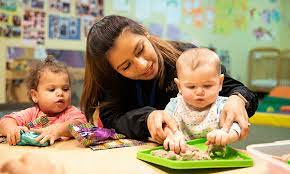Early childhood education is more than just babysitting; it the child’s brain with a pivotal foundation for a child’s lifelong development. The early years of a child’s life are a critical period for learning, growing, and building essential skills. In this article, we’ll explore the numerous benefits of early childhood education, highlighting its profound impact on children’s intellectual, social, and emotional development.
1. Cognitive Development
Early childhood education offers a structured learning environment that the child’s development and nurtures cognitive development. Children engage in activities that stimulate their curiosity, problem-solving skills, and creativity. They learn to count, identify shapes, colours, and letters, setting the stage for future academic success.
2. Social Skills
Interacting with peers and educators in an early childhood setting fosters the development of crucial social skills early childhood years. Children learn how to share, communicate, and collaborate with others, laying the groundwork for healthy relationships and effective teamwork in the future.
3. Emotional Development
Early education environments provide a safe space for children to explore and understand their emotions. They learn how to express themselves, manage their feelings, form positive relationships, and develop emotional intelligence.
4. Independence and Confidence
In early childhood and early education programs, children are encouraged to make choices and decisions independently. This nurtures a sense of confidence and self-reliance, which are essential life skills.
5. Language Skills
Early childhood education exposes children to language-rich environments. They develop better communication skills, larger vocabularies, and improved grammar, and numeracy skills which are essential for success in school and beyond.
6. Readiness for Formal Education
Children who attend early childhood education programs are better prepared for formal schooling. They enter kindergarten with a solid foundation, making it easier for them to adapt to the academic environment, attend school and excel in their studies.
7. Problem-Solving and Critical Thinking
Early education encourages children to think critically and solve problems independently. They learn to approach challenges with a curious and open mind, skills that are invaluable throughout life.
8. Creativity and Imagination
Through activities like art, music, and storytelling, children in early education settings have the opportunity to develop social skills and nurture their creativity and imagination. These skills are not only vital for artistic pursuits but also for innovative thinking in any field.
9. Early Exposure to Diversity
Early childhood education often involves interaction with peers from diverse backgrounds. This exposure promotes acceptance, empathy, and an understanding of different cultures and perspectives.
10. Long-Term Success
Research consistently shows that children who have access to early childhood education are more likely to graduate from high school, pursue higher education, and secure stable employment in the future. The benefits extend well beyond primary school and into adulthood.
Early Childhood Education Programs
Early childhood education programs are a gateway to a child’s bright future. These programs are specifically designed to cater to the developmental needs of young children, setting the stage for lifelong learning and future success.
Types of Early Childhood Education Programs
Early childhood education comes in various forms, catering to the diverse needs and preferences of families. Some common types of early childhood educators programs include:
- Preschool: These programs are usually designed for children aged three to five and focus on early learning and social development.
- Nursery Schools: Nursery schools serve children from infancy to five years old, offering a nurturing and educational environment.
- Montessori: Montessori programs follow the Montessori philosophy, which encourages self-directed learning and exploration.
- Childcare Centers: Childcare centers offer full-time care and early education for working parents.
- Head Start: Head Start is a federal program that provides comprehensive early childhood education, nutrition, and health services to low-income families.
- Home-Based Programs: Some early childhood education programs are offered in a home-based setting, often by licensed childminders.
Quality Early Childhood Education
Quality early childhood education is a powerful catalyst for children child’s emotional growth and development. These programs are carefully designed to provide a nurturing and structured environment that fosters cognitive, social, and emotional skills.
Characteristics of Quality Early Childhood Education
- Highly Qualified Educators: Quality programs are staffed with educators who have relevant qualifications and training in early childhood education. They understand the developmental needs of young children and create a supportive learning environment.
- Engaging Curriculum: These programs offer a well-planned curriculum that balances play-based learning and structured activities. The curriculum is designed to develop key skills while fostering curiosity and creativity.
- Low Student-to-Teacher Ratios: Smaller class sizes enable educators to provide individualised attention, ensuring each child’s unique needs are met.
- Safe and Nurturing Environment: Quality early childhood education centres prioritise the safety and well-being of children. They provide a clean, child-friendly space that supports exploration and discovery.
- Parent Involvement: These programs encourage parent involvement and open communication. Parents are seen as partners in their child’s education and receive regular updates on their child’s progress.
- Assessment and Individualised Learning: Educators assess each child’s progress and adapt teaching methods to cater to their individual needs and abilities.
Early Learning
Early learning is a profound and transformative journey that sets the stage for a child’s lifelong development and success. The early years of a child’s life are a crucial period for learning, growth brain development, and building essential skills.
The Importance of Early Learning
Early learning encompasses the period from birth to around eight years old and is a critical time for cognitive, social, and emotional development. It provides a structured and nurturing environment where children can develop fundamental skills and abilities. Here are key reasons why early learning is crucial to child care:
- Cognitive Development: Early learning activities stimulate children’s cognitive growth, helping them develop foundational skills such as numeracy, literacy, and problem-solving.
- Social Skills: Interacting with peers and educators in early learning environments nurtures vital social skills, such as cooperation, communication, and teamwork.
- Emotional Development: These experiences provide children with a safe space to explore and understand their emotions, fostering emotional intelligence.
- Independence and Confidence: Early learning encourages children to make choices and decisions independently, promoting self-reliance and confidence.
- Language Skills: Exposure to language-rich environments in early learning settings leads to improved communication skills, larger vocabularies, and better grammar.
- Readiness for School: Children who engage in early learning activities are better prepared for formal schooling, making the transition to primary education smoother.
- Problem-Solving and Critical Thinking: Early learning fosters critical thinking and problem-solving skills, enabling children to approach challenges with curiosity and innovation.
- Creativity and Imagination: Activities such as art, music, and storytelling nurture creativity and imaginative thinking, valuable skills for various life pursuits.
- Exposure to Diversity: Early learning often involves interaction with peers from diverse backgrounds, promoting acceptance, empathy, and cultural awareness.
Academic Performance
Academic performance is a pivotal aspect of a student’s educational journey. It encompasses the ability to achieve success in various educational endeavours, from classroom assignments to high-stakes examinations.
Investing in early childhood education is an investment in a child’s future. It provides a strong foundation for cognitive, social, and emotional development early age on, setting the stage for a lifetime of learning and success. By providing children with quality early education, we empower them to become confident, capable, and resilient individuals who can contribute positively to society.




Recent Comments